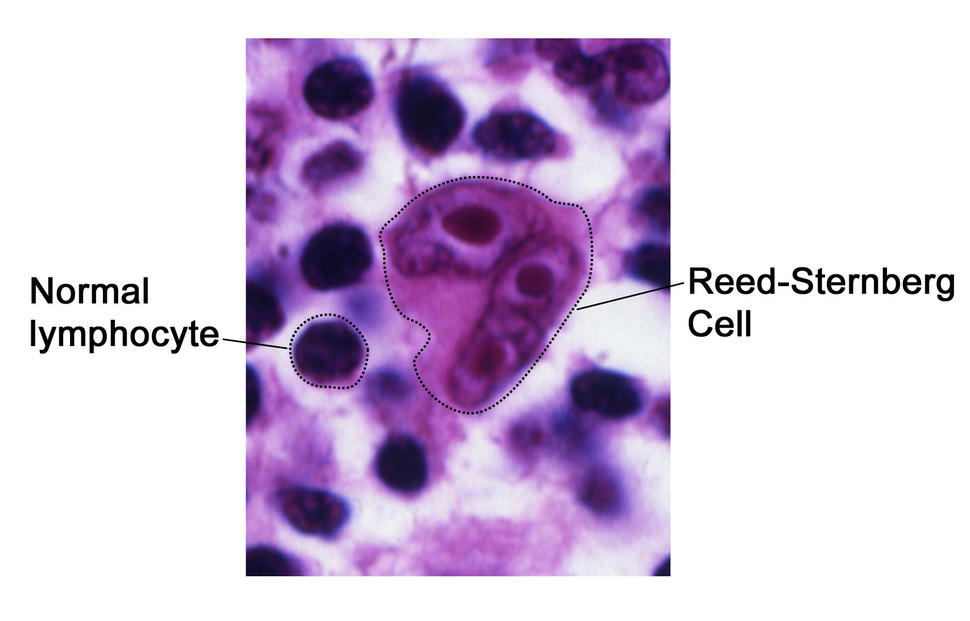FDA Approves First Immunotherapy for Lymphoma
, by NCI Staff
The U.S. Food and Drug Administration (FDA) approved nivolumab (Opdivo®) on May 17 for the treatment of some patients with classical Hodgkin lymphoma (cHL). The approval is for the treatment of patients whose disease has relapsed or worsened after they received an autologous hematopoietic stem cell transplantation (HSCT) followed by brentuximab vedotin (Adcetris®).
Nivolumab—which has already been approved for the treatment of metastatic melanoma, lung cancer, and kidney cancer—is the first immunotherapy agent approved for any type of lymphoma.
Nivolumab is a monoclonal antibody that inhibits a protein receptor called PD-1 on T cells, a type of immune cell. PD-1 belongs to a family of so-called checkpoint proteins which, when activated, serve as a brake on the immune system. Nivolumab prevents tumor cells from communicating through the PD-1 protein to inactivate T cells, allowing the immune system to attack the tumor cells.
“Patients with newly diagnosed Hodgkin lymphoma have a relatively good prognosis overall, but patients who relapse after autologous HSCT actually have a poor prognosis,” said Mark Roschewski, M.D., of the Lymphoid Malignancies Branch in NCI’s Center for Cancer Research. “Nivolumab provides a new therapy option for patients with an unmet clinical need.”
The accelerated approval was based on two single-arm, multicenter trials of nivolumab in 95 adult patients with relapsed or refractory cHL who had previously been treated with autologous HSCT followed by brentuximab vedotin. Under accelerated drug approvals, continued approval for the new indication is typically contingent upon verifying that the drug has a clinical benefit (e.g., improved progression-free or overall survival) in a randomized phase III clinical trial.
In the single-arm trials, 65% of patients had an objective response—with 7% experiencing a complete response. The estimated median duration of patient response was 8.7 months, and the median time-to-response was 2.1 months.
The response rate to nivolumab in patients with cHL is higher than has been seen in the other cancers for which the drug is already approved. The higher response rate is likely due to the biology of the disease, Dr. Roschewski noted. “Recent studies suggest that almost all Hodgkin lymphoma tumor cells have a genetic aberration that causes them to overexpress the binding partners, or ligands, for the PD-1 receptor,” he said.
Nivolumab’s safety was evaluated in 263 patients with relapsed or refractory cHL, 98% of whom had received autologous HSCT. The most common side effects included fatigue, upper respiratory tract infection, and diarrhea.
Serious side effects were reported in 21% of patients, the most common of which included pneumonia, pleural effusion, pneumonitis, and rash.
The FDA added a warning to the nivolumab package label about the risk of complications in patients who receive nivolumab followed by allogeneic stem cell transplant. The warning advises clinicians to closely monitor patients for early evidence of transplant-related complications, such as graft-versus-host disease (GVHD).
Nivolumab is generally well-tolerated, Dr. Roschewski noted. The main side effects seen in these and other studies of the drug are related to the risk of overstimulating immune cells and inducing autoimmune complications, such as GVHD, he explained.
“Overall, the approval of nivolumab for patients with relapsed and refractory Hodgkin lymphoma is a significant and important advance for the treatment of this heavily pretreated patient population,” he said.
“The efficacy of this drug as a single agent is impressive. However, given that the duration of remission was only 8.7 months and the complete remission rate was only 7%, nivolumab will likely not result in a cure by itself when given late in the disease,” he continued. “It will be interesting to see the results of ongoing trials testing this agent in combination with other agents with known efficacy in Hodgkin lymphoma.”
